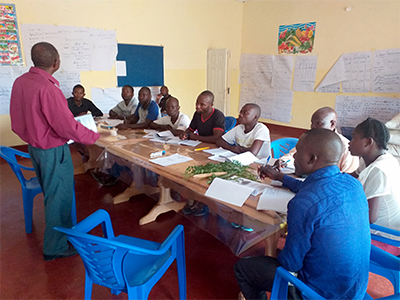Before the installation of solar panels at Kamisamba Farm in the Democratic Republic of the Congo, the property had no power source. Electric lines did not extend from the town of Kamina, a little over four miles away. Even in Kamina, particularly during the rainy season, residents can go without electricity for a month or more.
Although the farm has a water source from wells dug a few years ago, without electricity, there was no way to pump the water to where it was needed.
“The solar project came at a crucial time,” Lorraine Charinda explained in an interview. Charinda is a missionary from Zimbabwe assigned to Kamisamba Farm as an agriculturist and rural economic development specialist. She attended Africa University for her Bachelor of Science degree in agriculture and natural resources and the University of Namibia for a Master of Science in agricultural economics. She arrived at Kamisamba in 2018, thinking she was taking over a fully functioning farm. When she arrived, she discovered a couple of workers, dilapidated buildings, four pigs and half an acre of vegetables cultivated on the 500-acre farm. Three years later, the farm is fully functional.
The solar energy system and accompanying water pipes and pumps came about through a combination of grants from Global Ministries’ Environmental Sustainability program and UMCOR. “Before we installed the solar panels, batteries, inverters and water system, people used the bucket system – you go to the well with a bucket,” Charinda said.

At the recent board of directors’ meeting, Roland Fernandes, general secretary of Global Ministries, announced a major grant and confirmed Global Ministries’ deepening commitment to emission reduction and exploring ways to provide renewable energy to places like North Katanga.
One of the main facilities of Kamisamba Farm is a teaching center, which includes dormitories for up to 40 people. Participants come to scheduled training programs for a few days or a few months. Without electricity or running water, it was difficult to host those who came.
Charinda had the training center up and running before she started farm production. In Haut-Lomami, the province that includes Kamina and most of the North Katanga area, 80% of the population lives below the poverty line. Farming is the main source of income, and 90% of the population uses traditional subsistence agriculture to survive. Most cannot produce enough to feed their families, afford basic education for their children or medical care. Many people survive on one meal a day.
With UMCOR’s support, Kamisamba held a “train the trainers” event with participants sent from each district to learn the basics of starting, caring for and harvesting more productive gardens. They then took the knowledge back to their districts to train others.
Today, the farm is doing well – with 50 pigs, chickens, ducks, goats and fish ponds. They farm more than 35 acres with vegetables, grains and fruit trees. They’ve held trainings in 21 of North Katanga’s 24 districts, and provided seeds, animals, small fish or saplings to participants. Training onsite in communities helps Kamisamba workers discern which type of production has the best chance to thrive in a given area. After training, they visit again to accompany people through the first growing season. As farmers experience increased yields, training on marketing and conserving seed for the next season helps them gain perspective on farming as a business beyond subsistence.
excerpt from a story by Christie R. House, consultant writer and editor, Global Ministries and UMCOR.
One of seven apportioned giving opportunities of The United Methodist Church, the Africa University Fund transforms Africa by educating and empowering students from across the continent through Africa University, the first fully accredited, United Methodist-related educational institution on the continent. The Africa University Fund supports the general operating expenses of Africa University including faculty and staff salaries and vital infrastructure. Please encourage your leaders and congregations to support the Africa University Fund at 100 percent.





